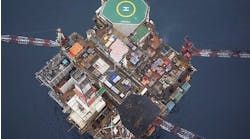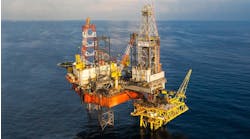Norway's offshore companies and technology are already well known around the world, but now the country is getting serious about establishing a weighty and enduring international presence.
At the prompting of the government, the industry has taken a collective look at opportunities on the world market and last year, in the so-called Intsok report, delivered its recommendations about how the "internationalisation" campaign should proceed.
Intsok is the third joint government/industry initiative in the oil sector. The others are Norsok, the campaign to reduce costs and project times on the Norwegian shelf, and Miljoesok, an environmental campaign.
The Intsok report was prepared by a steering group consisting of representatives of oil companies, suppliers, finance houses and the Norwegian Trade Council, under the leadership of Johan Nic Vold, Statoil's executive vice-president for international activities. Representatives of the authorities sat in as observers. There was general consensus that the commercial players should be in the driving seat.
Intsok's mission was defined as: strengthening the long-term foundation for wealth creation and employment in Norway's oil industry through focused international activities, taking as the point of departure the competitive strength of the Norwegian continental shelf.
A detailed questionnaire was circulated round the industry to gather information on companies' capabilities, activities and ambitions with respect to the export market.
Based on this information, the report proposes that the industry can realistically set itself the target of raising international sales from some NKr 17.5 billion in 1995 to NKr 25 billion in 2000 and NKr 50 billion in 2005 - a threefold increase in 10 years.
Norwegian offshore technology is assessed as having a good potential market, with particular strengths in the areas of seismic technology, equipment and systems for drilling and well operations, pipelines, large platforms, subsea installations and floating production systems.
The report identifies three groups of countries and regions on which it proposes that the internationalization drive should be concentrated. The choice of these countries has been guided by consideration of a number of criteria, such as whether their markets have an offshore focus, whether they offer good opportunities for Norwegian industry, whether Norwegian oil companies or leading contractors are already present in them, and whether they show interest in the Norwegian experience.
The steering committee has deliberately limited the number of countries and regions proposed for each group, so that efforts are not spread over too wide a front.
The first group consists of a number of project areas, rather than actual countries, in which Norwegian industry can directly attempt to become involved. These areas are in countries which are for the most part culturally and socially similar to Norway. The projects themselves usually involve challenges similar to those faced by projects on the Norwegian shelf.
- The West of Shetland area in the UK;
- Canada's Grand Banks;
- The Gulf of Mexico in the US;
- The Natuna Sea in Indonesia.
The next group comprises regions classified as appropriate for a coordinated focus, involving a planned and systematic approach between Norwegian industry and authorities. Proposed for inclusion in this group are:
- Caspian Sea - Azerbaijan and Kazakhstan;
- West Africa - Angola and Nigeria;
- Southeast Asia - Vietnam and Malaysia.
Thirdly come the "new possibilities" - countries and regions with an attractive oil potential but where conditions are thought to be not yet suitable for a "coordinated focus". Proposals for this category are:
- Northwest Russia;
- Middle East - Iraq and Iran;
- Latin America - Brazil, Mexico and Venezuela;
- Libya.
Other candidates for inclusion in this group are Algeria, India, East Africa, China and Northwest Australia.
The report acknowledges the importance of human rights issues, but does not see them as an obstacle to working abroad. Most countries are guilty of human rights abuses, it says. It sees the Norwegian presence as a positive factor in such situations, noting that "long-term economic cooperation according to Norwegian patterns and values can make a contribution to advancing social justice, an improved work environment and respect for democratic principles alongside economic growth and greater independence."
Among the range of measures proposed for achieving Intsok's aims, the report recommends that the Intsok organisation itself should play a central and pro-active role, setting up a network through which the various parties can cooperate and contribute, acting as a source of information for the Norwegian industry on foreign markets, particularly in the priority countries and regions, and as a source of information about Norway for the foreign markets.
It wants to see the actions of government departments and agencies better aligned with Norwegian industry's needs in the world market, for example, by the country's aid agencies giving special attention to Intsok's priority countries and regions, and suggests that Intsok should have a leading role in deciding the balance between political and economic interests.
Copyright 1997 Oil & Gas Journal. All Rights Reserved.


